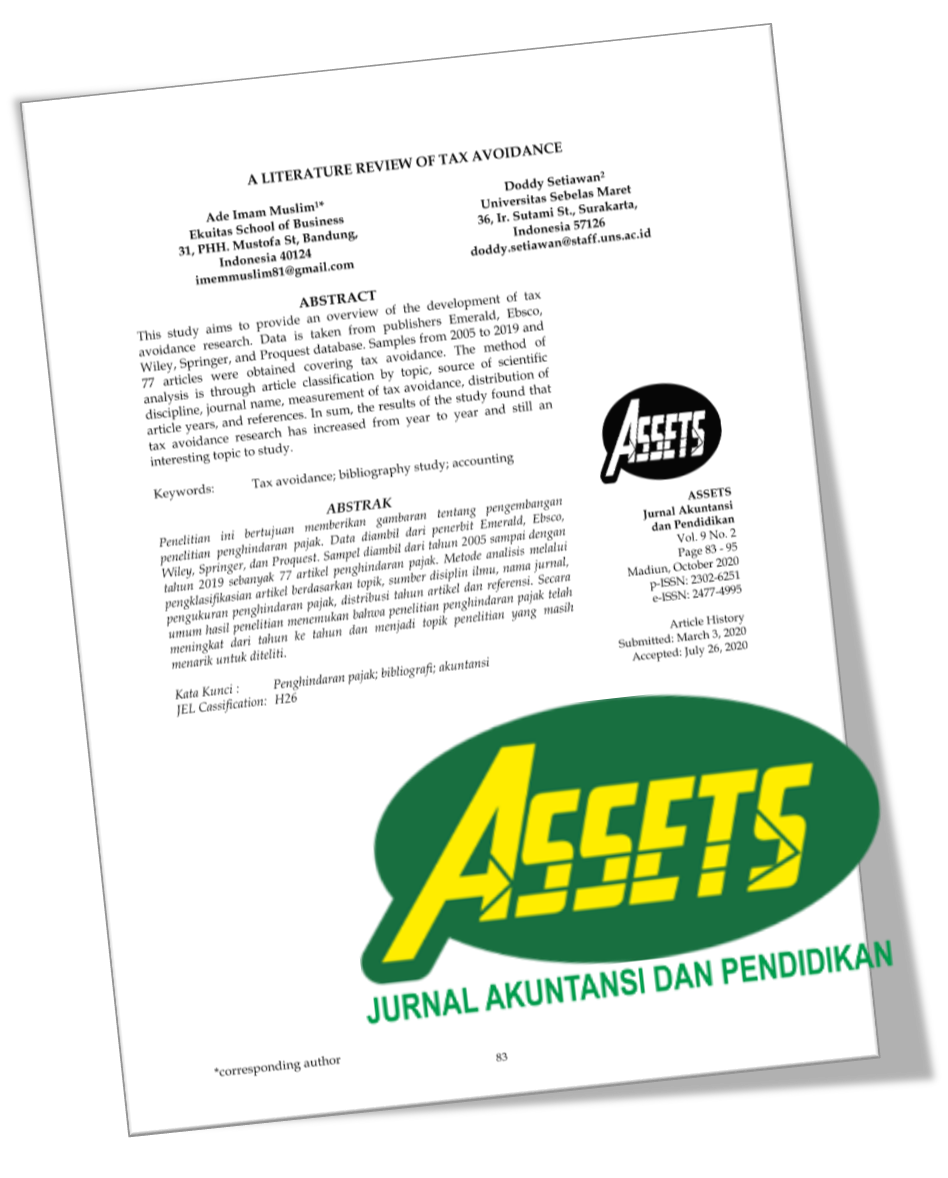Effect of Foreign Commissioners, Ethnic Commissioners, Feminism Commissioners Towards CSR Disclosure
DOI:
https://doi.org/10.25273/jap.v9i1.5564Keywords:
CSR disclosure, foreign commissioners, ethnic commissioners, feminism commissioners, corporate governance, dewan komisaris asing, etnis dewan komisaris, feminism dewan komisarisAbstract
ABSTRACT
The study aims to test whether the foreign commissioners, ethnic commissioners, and feminism commissioners influence CSR disclosure. This study used a sample of 20 companies LQ-45 are listed on the Stock Exchange from 2015 to 2017. CSR disclosure using the GRI-G4 standard. Ethnic commissioners focused on the presence of ethnic Chinese. The results of this study prove that the foreign commissioners’ variables did not affect CSR disclosure. While on the contrary, ethnic commissioners and feminism commissioners gave a positive effect on CSR disclosure. The existence of ethnic Chinese in the board profitable companies to improve disclosure of CSR index. Likewise, the role of women is needed for the breadth of CSR disclosure.
ABSTRAK
Penelitian bertujuan untuk menguji apakah dewan komisaris asing, etnis dewan komisaris, dan feminism dewan komisaris mempengaruhi CSR dislosure. Penelitian ini menggunakan sampel 20 perusahaan LQ-45 yang terdaftar di BEI dari 2015-2017. CSR disclosure menggunakan GRI-G4 standard. Etnis dewan komisaris terfokus pada keberadaan etnis Cina. Adapun Hasil penelitian ini membuktikan bahwa variabel dewan komisaris asing tidak berpengaruh terhadap CSR disclosure. Sedangkan sebaliknya, etnis dewan komisaris dan feminism dewan komisaris memberikan pengaruh yang positif terhadap CSR disclosure. Keberadaan etnis Cina dalam dewan menguntungkan perusahaan untuk meningkatkan index CSR disclosure. Begitu juga peran wanita sangat dibutuhkan demi luasnya CSR disclosure.
Downloads
References
Abad, D., Lucas-Pérez, M. E., Minguez-Vera, A., & Yagüe, J. (2017). Does gender diversity on corporate boards reduce information asymmetry in equity markets? BRQ Business Research Quarterly, 20(3), 192–205. https://doi.org/10.1016/j.brq.2017.04.001
Abdul, W. E. A., Marzuki, M. M., Jaafar, S. B., & Masron, T. A. (2018). Board diversity and total directors’ remuneration: evidence from an emerging market. Pacific Accounting Review, 30(2), 243–272. https://doi.org/10.1108/PAR-02-2016-0021
Alazzani, A., Wan-Hussin, W. N., & Jones, M. (2019). Muslim CEO, women on boards and corporate responsibility reporting: some evidence from Malaysia. Journal of Islamic Accounting and Business Research, 10(2), 274–296. https://doi.org/10.1108/JIABR-01-2017-0002
Antoro, D. A., & Hermuningsih, S. (2017). Kebijakan Dividen dan BI Rate Sebagai Pemoderasi Likuiditas, dan Leverage Terhadap Nilai Perusahaan Perbankan yang Terdaftar Di BEI. 2(1).
Ayuso, S., & Argandoña, A. (2007). Responsible corporate governance: Towards a stakeholder board of directors? IESE Research Papers. Retrieved from https://ideas.repec.org/p/ebg/iesewp/d-0701.html
Barka, H. Ben, & Dardour, A. (2015). Investigating the relationship between director’s profile, board interlocks and corporate social responsibility. Management Decision, 53(3), 553–570. https://doi.org/10.1108/MD-12-2013-0655
Bear, S., Rahman, N., & Post, C. (2010). The Impact of Board Diversity and Gender Composition on Corporate Social Responsibility and Firm Reputation. Journal of Business Ethics, 97(2), 207–221. https://doi.org/10.1007/s10551-010-0505-2
Branco, M. C., & Rodrigues, L. L. (2008). Factors Influencing Social Responsibility Disclosure by Portuguese Companies. Journal of Business Ethics, 83(4), 685–701. https://doi.org/10.1007/s10551-007-9658-z
Bustami, R., Nasruddin, E., Sen, K., & Ng, F. (2011). Ethnic Diversity in the Pluralistic Economy: Corporate Social Responsibility (CSR) in Four Critical Areas of Organizational Integration in Malaysia and Beyond. In Asian CSR and Sustainability Review (Vol. 2).
Calabrese, A., Costa, R., Ghiron, N. L., & Menichini, T. (2018). Gender Equality Among CSR Managers and its Influence on Sustainable Development: A Comparison Among Italy, Spain and United Kingdom. European Journal of Sustainable Development, 7(4), 451–462. https://doi.org/10.14207/ejsd.2018.v7n4p451
Cook, A., & Glass, C. (2018). Women on corporate boards: Do they advance corporate social responsibility? Human Relations, 71(7), 897–924. https://doi.org/10.1177/0018726717729207
Dani, A. C., Picolo, J. D., & Klann, R. C. (2019). Gender influence, social responsibility and governance in performance. RAUSP Management Journal, 54(2), 154–177. https://doi.org/10.1108/RAUSP-07-2018-0041
Dewi, K., & Monalisa, M. (2016). Effect of Corporate Social Responsibility Disclosure on Financial Performance with Audit Quality as a Moderating Variable. Binus Business Review, 7(2), 149. https://doi.org/10.21512/bbr.v7i2.1687
DEZSÅ, C. L., & ROSS, D. G. (2012). DOES FEMALE REPRESENTATION IN TOP MANAGEMENT IMPROVE FIRM PERFORMANCE? A PANEL DATA INVESTIGATION. Strategic Management Journal, Vol. 33, pp. 1072–1089. https://doi.org/10.2307/23261318
Erhardt, N. L., Werbel, J. D., & Shrader, C. B. (2003). Board of Director Diversity and Firm Financial Performance. (February). https://doi.org/10.1111/1467-8683.00011
Galbreath, J. (2018). Is Board Gender Diversity Linked to Financial Performance? The Mediating Mechanism of CSR. Business and Society, 57(5), 863–889. https://doi.org/10.1177/0007650316647967
Giannarakis, G. (2014). The determinants influencing the extent of CSR disclosure. International Journal of Law and Management, 56(5), 393–416. https://doi.org/10.1108/IJLMA-05-2013-0021
Glass, C., Cook, A., & Ingersoll, A. R. (2016). Do Women Leaders Promote Sustainability? Analyzing the Effect of Corporate Governance Composition on Environmental Performance. Business Strategy and the Environment, 25(7), 495–511. https://doi.org/10.1002/bse.1879
Haniffa, R. M., & Cooke, T. E. (2005). The impact of culture and governance on corporate social reporting. Journal of Accounting and Public Policy, 24(5), 391–430. Retrieved from https://econpapers.repec.org/article/eeejappol/v_3a24_3ay_3a2005_3ai_3a5_3ap_3a391-430.htm
Harjoto, M. A., Laksmana, I., & Yang, Y. wen. (2019). Board nationality and educational background diversity and corporate social performance. Corporate Governance: The International Journal of Business in Society, 19(2), 217–239. https://doi.org/10.1108/CG-04-2018-0138
Ibrahim, A. H., & Hanefah, M. M. (2016). Board diversity and corporate social responsibility in Jordan. Journal of Financial Reporting and Accounting, 14(2), 279–298. https://doi.org/10.1108/JFRA-06-2015-0065
Isa, M. A., & Muhammad, S. (2014). The Impact of Board Characteristics on Corporate Social Responsibility Disclosure: Evidence from Nigerian Food Product Firms. International Journal of Management Science and Business Administration, 1(12), 34–45. https://doi.org/10.18775/ijmsba.1849-5664-5419.2014.112.1004
Kamangari, A., & Gerayli, M. S. (2017). Board Diversity and Corporate Social Responsibility: Evidence from Iranian Firms. In Board Diversity and Corporate Social Responsibility: Evidence from Iranian Firms (Vol. 2).
Khan, A., Muttakin, M. B., & Siddiqui, J. (2013). Corporate Governance and Corporate Social Responsibility Disclosures: Evidence from an Emerging Economy. Journal of Business Ethics, 114(2), 207–223. https://doi.org/10.1007/s10551-012-1336-0
Khan, I., Khan, I., & Saeed, B. bin. (2019). Does board diversity affect quality of corporate social responsibility disclosure? Evidence from Pakistan. Corporate Social Responsibility and Environmental Management, csr.1753. https://doi.org/10.1002/csr.1753
Louis, O., & Osemeke, N. (2017, May 1). The role of ethnic directors in corporate social responsibility: Does culture matter? the cultural trait theory perspectives. International Journal of Disclosure and Governance, Vol. 14, pp. 152–172. https://doi.org/10.1057/s41310-017-0018-7
Lückerath-Rovers, M. (2013). Women on boards and firm performance. Journal of Management and Governance, 17(2), 491–509. https://doi.org/10.1007/s10997-011-9186-1
Lusiana, & Rahma, A. A. (2017). Pengaruh Firm Size, Profitability, Audit Committee Size, Dan Auditor Opinion Terhadap Audit Delay Pada Perusahaan LQ-45 Yang Terdaftar Di Bursa Efek Indonesia Tahun 2011-2015. Majalah Ilmiah, 24(1), 191–205.
MacHold, S., Ahmed, P. K., & Farquhar, S. S. (2008). Corporate governance and ethics: A feminist perspective. Journal of Business Ethics, 81(3), 665–678. https://doi.org/10.1007/s10551-007-9539-5
Majeed, S., Aziz, T., & Saleem, S. (2015). The Effect of Corporate Governance Elements on Corporate Social Responsibility (CSR) Disclosure: An Empirical Evidence from Listed Companies at KSE Pakistan. International Journal of Financial Studies, 3(4), 530–556. https://doi.org/10.3390/ijfs3040530
McDonald, M. L., Keeves, G. D., & Westphal, J. D. (2018). One step forward, one step back: White male top manager organizational identification and helping behavior toward other executives following the appointment of a female or racial minority CEO. Academy of Management Journal, 61(2), 405–439. https://doi.org/10.5465/amj.2016.0358
Mullins, A., & Soetanto, R. (2013). Ethnic differences in perceptions of social responsibility: informing risk communication strategies for enhancing community resilience to flooding. 119–131. https://doi.org/10.1108/09653561311325271
Nuryaman. (2013). The Effect Of Corporate Social Responsibility Actlvltes On Profitability And Stock Price. Journal of Global Management, 6(1). Retrieved from https://repository.widyatama.ac.id/xmlui/handle/123456789/8806
Nussy, T. M. (2013). Corporate Governance dan Etnisitas terhadap Pengungkapan Corporate Social Responsibility. 17(1), 1–10.
Odriozola, M. D., & Baraibar-Diez, E. (2018). Do work-life balance practices mediate in the relationship between female participation and financial performance? European Journal of Management and Business Economics, 27(3), 249–265. https://doi.org/10.1108/EJMBE-08-2017-0009
Osemeke, N., & Osemeke, L. (2017). The Role of Ethnic Directors in Corporate Social Responsibility: Does Culture matter? The Cultural Trait Theory Perspectives . Retrieved from http://researchonline.ljmu.ac.uk/
Oxelheim, L., & Randøy, T. (2003). The impact of foreign board membership on firm value. Journal of Banking & Finance, 27, 2369–2392. https://doi.org/10.1016/S0378-4266(02)00395-3
Rahindayati, N. M., Ramantha, I. W., & Rasmini, N. K. (2015). PENGARUH DIVERSITAS PENGURUS PADA LUAS PENGUNGKAPAN CORPORATE SOCIAL RESPONSIBILITY PERUSAHAAN SEKTOR KEUANGAN .
Rahma, A. A., Lusiana, & Indriani, P. (2019). Pengaruh Struktur Modal, Profitabilitas dan Size Perusahaan terhadap Ketepatan Waktu Pelaporan Keuangan pada Perusahaan Manufaktur. 210–220. https://doi.org/10.22216/jbe.v4i2.3698
Rahma, A. A., Mary, H., & Gozali, C. (2019). Pengaruh Komposisi Dewan Komisaris terhadap Capital Structure pada Perusahaan Manufaktur. SINMAG3, 2(2).
Ramasamy, B., Ling, N. H., & Ting, H. W. (2007). Corporate Social Performance and Ethnicity. International Journal of Cross Cultural Management, 7(1), 29–45. https://doi.org/10.1177/1470595807075169
Respati, R. D., & Hadiprajitno, P. B. (2015). Analisis Pengaruh Profitabilitas, Leverage, Ukuran Perusahaan, Tipe Industri, Dan Pengungkapan Media Terhadap Pengungkapan Corporate Social Responsibility. Retrieved from http://ejournal-s1.undip.ac.id/index.php/accounting
Rusmanto, T., Syahbandiah, V. P., & Waworuntu, S. R. (2014). The Impact of Corporate Governance on Corporate Social Responsibility Disclosure: Evidence from Indonesia.
Said, R., Joseph, C., & Sidek, N. Z. M. (2017). Corporate governance and corporate social responsibility (CSR) disclosure: The moderating role of cultural values. Developments in Corporate Governance and Responsibility, 12, 189–206. https://doi.org/10.1108/S2043-052320170000012013
Sudana, I. M., & Arlindania, P. A. (2011). Corporate Governance Dan Pengungkapan Corporate Social Responsibility Pada Perusahaan Go-Public Di Bursa Efek Indonesia. Jurnal Manajemen Teori Dan Terapan | Journal of Theory and Applied Management, 4(1). https://doi.org/10.20473/JMTT.V4I1.2411
Suhardjanto, D., & Permatasari, N. D. (2010). Pengaruh Corporate Governance, Etnis, dan Latar Belakang Pendidikan Terhadap Environmental Disclosure. Kinerja, 14(2), 151–164. Retrieved from https://media.neliti.com/media/publications/164653-ID-pengaruh-corporate-governance-etnis-dan.pdf
Tan, M. G. (2005). Ethnic Chinese in Indonesia. In Encyclopedia of Diasporas (pp. 795–808). https://doi.org/10.1007/978-0-387-29904-4_82
Wan Mohammad, W. M., Wasiuzzaman, S., & Nik Salleh, N. M. Z. (2016). Board and audit committee effectiveness, ethnic diversification and earnings management: a study of the Malaysian manufacturing sector. Corporate Governance (Bingley), 16(4), 726–746. https://doi.org/10.1108/CG-06-2015-0085
Williams, R. J. (2003). Women on Corporate Boards of Directors and their Influence on Corporate Philanthropy. Journal of Business Ethics, 42(1), 1–10. https://doi.org/10.1023/A:1021626024014
Yunos, R. M., Ismail, Z., & Smith, M. (2012). Ethnicity and accounting conservatism: Malaysian evidence. Asian Review of Accounting, Vol. 20, pp. 34–57. https://doi.org/10.1108/13217341211224718
Zaid, M. A. A., Wang, M., & Abuhijleh, S. T. F. (2019). The effect of corporate governance practices on corporate social responsibility disclosure. Journal of Global Responsibility, 10(2), 134–160. https://doi.org/10.1108/JGR-10-2018-0053
Zhang, J. Q., Zhu, H., & Ding, H. (2013). Board Composition and Corporate Social Responsibility: An Empirical Investigation in the Post Sarbanes-Oxley Era. Journal of Business Ethics, Vol. 114, pp. 381–392. https://doi.org/10.2307/23433787
Downloads
Additional Files
Published
Issue
Section
License
Perjanjian Lisensi dan Hak Cipta
Saat mengirimkan naskah ke jurnal, penulis menyatakan bahwa:
- Mereka diberi wewenang oleh rekan penulisnya untuk masuk ke dalam perjanjian ini.
- Karya yang dimaksud belum pernah diterbitkan secara resmi sebelumnya, kecuali dalam bentuk abstrak atau sebagai bagian dari kuliah, resensi, tesis, atau overlay jurnal yang diterbitkan.
- Karya yang dimaksud tidak sedang dipertimbangkan untuk diterbitkan di tempat lain,
- Publikasi karya yang dimaksud telah disetujui oleh semua penulis dan oleh otoritas yang bertanggung jawab - secara tahu sama tahu atau eksplisit - dari lembaga tempat pekerjaan itu dilakukan.
- Mereka mengamankan hak untuk mereproduksi materi apa pun yang telah diterbitkan atau dilindungi hak cipta di tempat lain.
- Mereka menyetujui lisensi dan perjanjian hak cipta berikut.
Hak Cipta
Penulis yang menerbitkan dengan ASSETS: Jurnal Akuntansi dan Pendidikan menyetujui persyaratan berikut:
- Penulis mempertahankan hak cipta dan memberikan jurnal hak publikasi pertama dengan karya yang secara bersamaan dilisensikan di bawah Lisensi Atribusi Creative Commons (CC BY-SA 4.0) yang memungkinkan orang lain untuk berbagi karya dengan pengakuan kepenulisan karya dan publikasi awal di jurnal ini.
- Penulis dapat masuk ke dalam pengaturan kontrak tambahan yang terpisah untuk distribusi non-eksklusif dari versi jurnal yang diterbitkan dari karya tersebut (misalnya, mempostingnya ke repositori institusional atau menerbitkannya dalam sebuah buku), dengan pengakuan publikasi awalnya di jurnal ini.
- Penulis diizinkan dan didorong untuk memposting karya mereka secara daring (misalnya di repositori institusional atau di situs web mereka) sebelum dan selama proses pengiriman, karena dapat menghasilkan pertukaran yang produktif, serta kutipan lebih awal dan lebih besar dari karya yang diterbitkan.
License and Copyright Agreement
In submitting the manuscript to the journal, the authors certify that:
- Their co-authors authorize them to enter into these arrangements.
- The work described has not been formally published before, except as an abstract or part of a published lecture, review, thesis, or overlay journal.
- That it is not under consideration for publication elsewhere,
- That its publication has been approved by all the author(s) and by the responsible authorities – tacitly or explicitly – of the institutes where the work has been carried out.
- They secure the right to reproduce any material already published or copyrighted elsewhere.
- They agree to the following license and copyright agreement.
Copyright
Authors who publish with ASSETS: Jurnal Akuntansi dan Pendidikan agree to the following terms:
- Authors retain copyright and grant the journal right of first publication with the work simultaneously licensed under a Creative Commons Attribution License (CC BY-SA 4.0) that allows others to share the work with an acknowledgment of the work's authorship and initial publication in this journal.
- Authors can enter into separate, additional contractual arrangements for the non-exclusive distribution of the journal's published version of the work (e.g., post it to an institutional repository or publish it in a book), with an acknowledgment of its initial publication in this journal.
- Authors are permitted and encouraged to post their work online (e.g., in institutional repositories or on their website) before and during submission, as it can lead to productive exchanges and earlier and more extraordinary citations of published work.

ASSETS: Jurnal Akuntansi dan Pendidikan is licensed under a Creative Commons Attribution-ShareAlike 4.0 International License.










